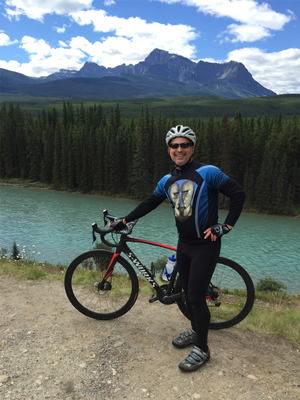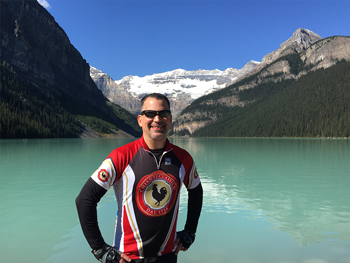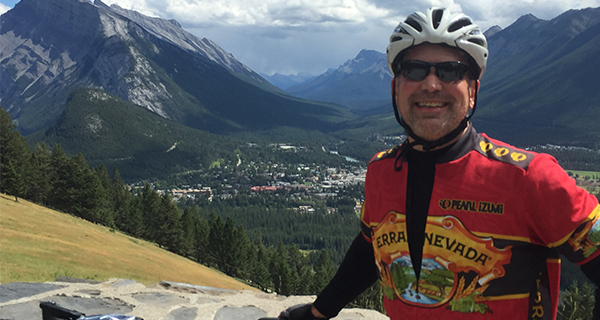BEN FRANKLIN TECHNOLOGY PARTNERS is a partner in Keystone Edge. They will be sharing insights from their leadership and news from their portfolio companies in the Ben Franklin On: section.
ANDREW STANTEN, president of Altitude Marketing in Emmaus, is an unwavering supporter of regional entrepreneurship and freely shares his expertise with startups, established manufacturers and students in northeastern Pennsylvania. Stanten is frequently spotted at Ben Franklin TechVentures, meeting one-on-one with Ben Franklin clients. Having earned his MBA from Lehigh University, he is a frequent guest lecturer at his alma mater, has led Marketing 101 courses at Lehigh’s Small Business Development Center and mentors student groups in Lehigh’s IBE program. He is also involved with the Rising Tide Community Loan Fund, a credit supplier to small businesses.
***
One of the great things about running your own company is the ability to make your own rules. And one of those rules at Altitude Marketing, implemented when I founded the company in 2004, is that partners must take a sabbatical every five years.
It sounds like a luxury, but in reality it’s a necessity.
The purpose is two-fold. There is the obvious need to recharge the batteries. Equally important, however, is gaining a clear understanding of how to best serve clients, scale the business, improve profitability and ensure the company can thrive without you.
 When you’re removed from work for a full month, you see where you’re really needed, where you are not and what is needed to fill in the gaps.
When you’re removed from work for a full month, you see where you’re really needed, where you are not and what is needed to fill in the gaps.
In mid-2015, the leadership team began examining what didn’t go so well the last time I took sabbatical. Then we moved on to a holistic, company-wide exercise looking at roles and responsibilities. Out of this, we deduced who could best wear each of my many hats — and what structurally and personnel-wise we would need to add, change or enhance in order to make my absence a non-issue.
On July 28, I left the office with complete confidence. I knew that the train would keep chugging along because we had started planning my time away nearly 18 months beforehand.
My adventure began in the Canadian Rockies: I cycled 300-plus miles from Banff to Jasper and took some amazing hikes. All that time in the saddle breathing fresh air got me thinking about the future. I came back to Altitude with a number of lessons to share.
1. Plan to get hit by the bus.
Or an RV. Day one of my ride, we climbed Mount Norquay Road to see an amazing view of Banff below. About 20 minutes into the climb, an RV came close. Too close. As a company leader, the best thing you can do for your business is recognize and accept that no one lasts forever. No one is irreplaceable. Even you.
What would happen if I actually got hit by the bus? Would the company shrivel? Would customers abandon us? Andrew Stanten
If you haven’t already done so, look around your organization and see if you can envision the one, two or three people that can take on all your responsibilities. If you come up empty, craft a job description and start looking.
Think you can skip this exercise? Ask yourself the question: What would happen if I actually got hit by the bus? Would the company shrivel? Would customers abandon us?
Next look at your leadership team and, if you can, move quickly to get a plan in place to scale that person, that role, that team and have redundancies in place in the event that you’re taken out of commission. Or leave.
2. Check your ego at the door.
I spoke to a variety of people leading up to and during my sabbatical: a pastor, rank-and-file professionals, lawyers, financial professionals, even a nuclear physicist. And when I told them I was taking five weeks off, they all asked if I was worried. My answer was an unequivocal, “No.”
I’ve learned a lot since starting this company in 2004. In the early days we were selling “me.” As a company, we have moved past that. It took a while.
As a leader, you need to move away from that thinking, too. It’s not about you. Success is about the people you surround yourself with — they are doing the day-to-day work that brings results. I’d rather be the third smartest person in a room of three and have great results than be the smartest person in the room any day. That’s removing ego from the equation.
One of my essential traits is that I am a long-range planner and big-picture thinker. Details elude me. They annoy me. That’s why I love my leadership team: They are all about the details. Andrew Stanten
Learn from past hiring mistakes, trust your gut and get the right people in the door. Then work to keep them. And make sure you and everyone in your organization checks their egos at that door.
3. Cover blind spots without resentment.
On the first day of cycling, I rode alongside an investment manager from Colorado. I was a stronger climber and more fearless on the descents, but he was much better on the long, rolling flats. I’d get right on his back wheel, drafting for kilometers at a time, going faster while using less energy. But every time we saw the support van, he’d need to stop to refuel because he’d always forget to load up before pushing off for the day.
By day two, this got a bit annoying.
On day three, I loaded a few extra energy bars in my saddle bag and two extra bottles of Gatorade in my jersey. I offered them to him so we didn’t have to stop. It was our best day on the road and set the tone for the rest of the trip. He’d pull me along; I’d keep him fueled.
 When I think back on the key moments in Altitude’s evolution — those that enabled our growth and afforded me the confidence to go away for five weeks — one was when we started practicing (and believing) that it’s okay to be imperfect. In fact, that belief is what makes a group of coworkers a high performing team.
When I think back on the key moments in Altitude’s evolution — those that enabled our growth and afforded me the confidence to go away for five weeks — one was when we started practicing (and believing) that it’s okay to be imperfect. In fact, that belief is what makes a group of coworkers a high performing team.
First, recognize your own weaknesses. Then, surround yourself with trusted people that willingly, skillfully and happily cover those blind spots. Formalize it. This may mean shuffling some roles and responsibilities.
One of my essential traits is that I am a long-range planner and big-picture thinker. Details elude me. They annoy me. That’s why I love my leadership team: They are all about the details. Rather than resenting the fact that I don’t flesh everything out, they fill in the gaps.
4. Slow and steady wins. Every time.
Day five of the ride featured a spectacular 15 kilometer climb up the Sunwapta Pass from the Saskatchewan River to the foot of the Athabasca Glacier. There was a small group of much younger, stronger riders.
Keep your eye on finish line, not the stops, bumps and climbs in between. They will cause you to pull over too often and your competitors just might beat you to the ultimate prize. Andrew Stanten
As the climb started, they zoomed past me and got to the first pit stop about 15 minutes before I did. I nodded as I rode past without stopping. A while later they zoom by again, getting to the next pit stop about 10 minutes before me. I nodded and kept going. By the time I passed the fourth pit stop where they were resting, it was over. I crested the pass and cruised down to the base of the glacier, beating them by a good 10 minutes.
The same lesson applies to your business. Investors be damned: I’ll take slow, steady growth any day over boom and bust. Don’t be so focused on the short-term financials. A week, month or a quarter shouldn’t determine the path you take. Stay focused on the longterm by making sure someone else — someone you trust — is focusing on all the various elements of the day-to-day. And then compare notes, at a high level, on a month-to-month basis.
In short, keep your eye on finish line, not the stops, bumps and climbs in between. They will cause you to pull over too often and your competitors just might beat you to the ultimate prize.
5. Eyes wide open.
At the beginning of each cycling day, everyone on the tour received a route briefing from our guide. I always went right to the end to see where I’d wind up if I made every climb, conquered every pass, slayed each downhill. Whether it was the spectacular view of Lake Moraine or the amazing accommodations at Jasper Lodge that awaited, that prize drove me to keep pushing myself when I thought I couldn’t make it the final 20K.
Never lose sight of what you are doing or why you are doing it.
For me, it is about my family — my immediate family and my Altitude family. And while that may sound cliché, it’s the truth. I push myself, my leadership team and the entire organization to exceed our clients’ needs and expectations for one simple reason: To make us all successful and to enable us to share in that success. I sign the paychecks. I feel a personal responsibility to all the families that count on that cash every month.
A lot of companies run like a roller coaster ride: get a new customer or hit a growth spurt, hire some people. Lose a client, fire some people. That doesn’t cut it. I spent a lot of time on my break thinking about my longterm goals and they all revolved around Altitude as a means to a very happy ending. For everyone involved.
This post originally appeared on AltitudeMarketing.com.



